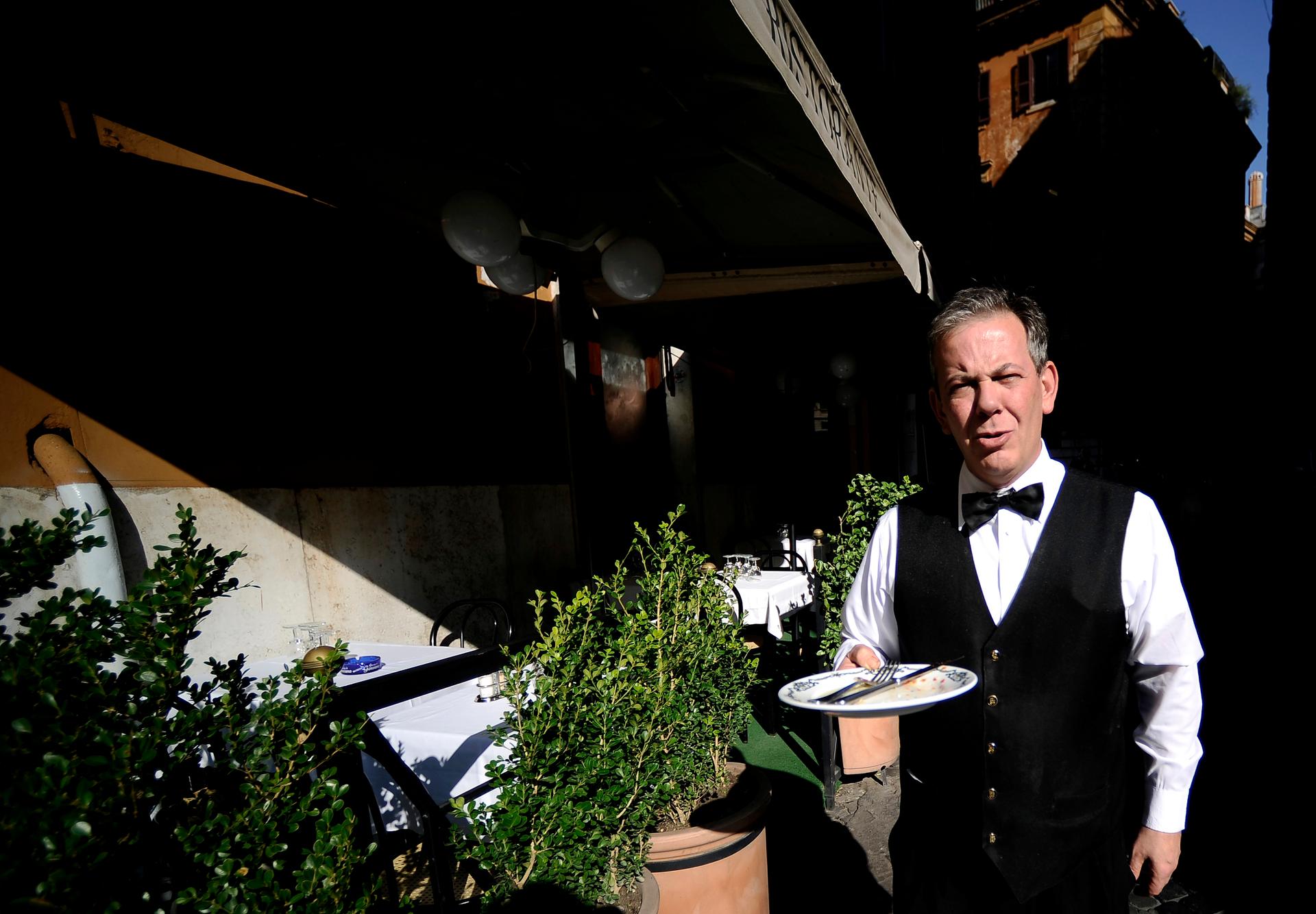In a papal transition, business booms at church-owned restaurants and hotels
A waiter carries a plate in front of a restaurant in downtown Rome in November 2011.
ROME – The classical music playing in the background of the French restaurant in central Rome, a few steps from the Senate, suddenly stops. The hushed noise of cutlery and whispered conversations comes to a halt as a voice from the loudspeakers recites a brief prayer.
After that, the waitresses intone a song to the Virgin Mary; the text is on a slip of paper that they quietly placed on the tables just a few minutes earlier. Slowly, as platters of canard and French cheese sit untouched, the customers join in the song. Finally, as the music and the prayer stops, the normal restaurant activities slowly start new.
This happens every night at 9 p.m. at L'Eau Vive, a restaurant offering French cuisine and matching wines run by French-speaking missionary sisters for over 40 years. The food will not disappoint you, but dinner costs more than a Hail Mary. A recent meal for four people, with one main course and wine, cost 160 euro, or about $208. And with a papal transition underway, business has never been better.
L'Eau Vive is one restaurant in a chain spanning five continents, all run by the Missionary Workers of the Immaculate, a religious order founded by Father Marcel Roussel-Galle in 1950. It is one of the many tourist venues run by church institutions in central Rome. Theyare usually full with pilgrims coming to Rome to catch a glimpse of the pope during the Sunday Angelus prayer and enjoy the renaissance masterpieces of the city.
But these days, as cardinals from all over the world swarm to the center of Christianity to prepare for the election of Pope Benedict's successor, their activity is even more frenzied, teeming with religious men and tourists alike, in Rome to witness this extraordinary time in the life of the Catholic Church.
Mother Tekla: The most powerful woman in Rome
Many religious houses that usually linger half-empty during lull months between Christmas and the beginning of the summer peak season are now bursting to the seams.
The most prestigious venues, just a stone’s throw from the Vatican, with terraces that overlook St. Peter's Square and Michelangelo's majestic dome, are making booming profits during this papal transition by renting their terraces to TV networks hungry for a prime spot in theweeks of the conclave. In fact, the most coveted locales are at the center of real bidding wars.
The papacy effectively ran the Eternal City for more than a thousand years and over the centuries, religious orders and congregations – as well as the Vatican itself, of course – amassed an enormous wealth of property in the city center and beyond.
As religious vocations fell in past decades, many of the palazzi and convents slowly emptied of sisters and monks, before finding a new life as “case di accoglienza” for tourists and pilgrims.
The rooms that once housed novices and nuns have been refurbished to the standards of contemporary tourism. In many cases, these religious houses are hard to tell from regular hotels.
Take for example the headquarters of the Order of St. Brigid on Piazza Farnese, a majestic square dominated by Michelangelo's Palazzo Farnese, which houses the French Embassy.
A double room at the Brigidine house goes for 140 euro, or $182 – not cheap, but definitely cheaper than a comparable hotel in the area.
The Brigidines are probably at the high-end of the religious accommodation sector; though their house in Assisi charges a more reasonable 50 euro, or $82 per person.
Savvy travelers who look for a bargain in the historical centers of Italian cities often turn to religious houses. In Rome, the Istituto Nostra Signora di Lourdes, right on the scenic Spanish Steps, asks 77 euro ($100 per night) for a double room. If you move farther from the center, rates can even halve.
And it's not just in Rome: in Florence, La Casa Madonna del Rosario asks $49.50 per night for a double, the Casa Cardinal Piazza in Venice ranges from about $72 to $114.
These church-run “hotels” are somewhat controversial for the tax-exempt status that many Catholic institutions enjoy. Introduced in 1992, the property tax exemption has been at the center of recurring polemics between secular activists and the church.
The Italian bishops’ conference says that properties used for commercial purposes – such as former convents turned into hotels – must pay taxes regularly and do so; secular activists retort that the exemption is invoked even when the part of the building used for religious purposes is minimal. The technocratic government of premier Mario Monti promised to review the norm and close loopholes. But so far, little has changed.
Every day, reporters and producers at The World are hard at work bringing you human-centered news from across the globe. But we can’t do it without you. We need your support to ensure we can continue this work for another year.
Make a gift today, and you’ll help us unlock a matching gift of $67,000!
